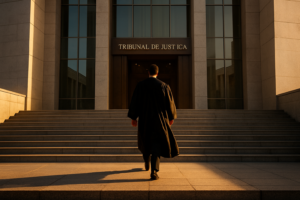We are part of the REDE
Lucchesi Advocacia is part of the REDE Ibero-Americana de Advocacia Criminal. It is not a symbolic affiliation but an alliance of law firms focused exclusively on criminal matters, present in Brazil, across Latin America, and in Portugal and Spain, aligned by technical excellence and ethics in criminal defense. We have been members for seven years, turning cooperation from an exception into a working method.
What it is and how it works
As set out in the Statute, the REDE connects criminal defense firms, enables practical cooperation (local support, diligences, referrals in case of conflicts), defends lawyers’ professional prerogatives, and maintains an ongoing forum on contemporary topics — compliance, minimum quality standards, and ethical limits in plea bargaining/leniency and other forms of cooperation in criminal cases. Composition is balanced: in Brazil there are up to two firms per state (up to three in São Paulo). In other countries, academic credentials and integrity programs guide admission. This logic — reach with common standards — is visible on Firms.
Why we represent Paraná (Brazil)
Our profile fits the REDE’s design: specialized criminal defense (corporate, economic, and environmental), ongoing scholarly production, university teaching, and a compliance program with quality routines. This allows frictionless cooperation. Case strategy stays centralized; execution outside Paraná relies on local operational support that knows the venue, procedures, and interlocutors — from deadlines to inspections, hearings, and certified copies.
Cooperation that delivers
In practice, when a client needs support outside our state, we activate trusted local partners for acts that require physical presence while keeping the defense line intact. Evidentiary directions and negotiation criteria follow a single strategy, with adjustments to each jurisdiction’s institutional environment. The result is less rework, fewer mismatches, and more time devoted to what actually moves the case.
Meetings that give substance
The REDE’s meetings help calibrate language and method. São Paulo consolidated the bridge between practice and academia; Santiago strengthened comparative discussions on economic crime; Belo Horizonte put technology and criminal procedure at the center; and Lima, in October 2025, combined two decisive fronts: dogmatics of corruption and money laundering and artificial intelligence and new technologies in legal practice and criminal defense. It is not a sequence of events for its own sake; it is a continuous line of work that improves coordination among teams that already operate together.
Our content matches the agenda
What we publish reflects that agenda. When we address chain of custody for digital evidence, we are discussing the minimum standard of verifiability that must be preserved in any jurisdiction. When we analyze negotiation in criminal procedure, we focus on objective criteria to accept or refuse agreements — a transversal topic in Brazilian Criminal Law and across Ibero-America, with local nuances that require coordinated reading. The REDE fosters the circulation of case law, scholarship, and applied experience.
What clients notice
Effects show up in everyday work. Coordinated response: urgent filings proceed on different fronts without losing context. Qualified local execution: those who file, argue, and appear in court know the venue and its routines. Common ethical standards: how we deal with authorities, collaborators, and parties is consistent from first contact to closure. Continuous learning: REDE debates return to practice through updated precedents and refined theses that directly impact defense work.
Cooperation with autonomy
Cooperation does not dilute responsibility. Each firm preserves its technical autonomy. When there is a conflict of interest, responsible referral is the path; when logistics demand realistic solutions, the network organizes the hand-off with criteria. The REDE exists to add: less procedural noise, more focus on substance and on outcomes that matter.
Looking ahead
Seven years after joining, we hold the same conviction. In 2026, we are planning new joint actions aligned with the technical-institutional agenda above. The goal remains: high standards, shorter distance between global strategy and local execution, and a sober reinforcement of the criminal defense we practice. For structure, criteria, and composition, see the official website — Alliance, Statute and Firms.



